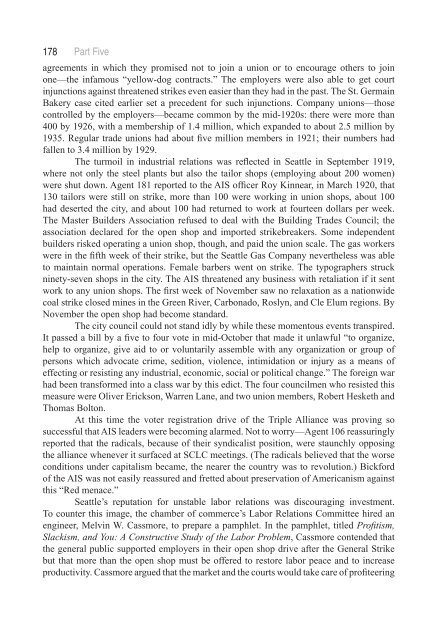Seattle: 1900-1920 -From Boomtown, Through Urban Turbulence ...
Seattle: 1900-1920 -From Boomtown, Through Urban Turbulence ...
Seattle: 1900-1920 -From Boomtown, Through Urban Turbulence ...
- No tags were found...
Create successful ePaper yourself
Turn your PDF publications into a flip-book with our unique Google optimized e-Paper software.
178 Part Fiveagreements in which they promised not to join a union or to encourage others to joinone—the infamous “yellow-dog contracts.” The employers were also able to get courtinjunctions against threatened strikes even easier than they had in the past. The St. GermainBakery case cited earlier set a precedent for such injunctions. Company unions—thosecontrolled by the employers—became common by the mid-<strong>1920</strong>s: there were more than400 by 1926, with a membership of 1.4 million, which expanded to about 2.5 million by1935. Regular trade unions had about five million members in 1921; their numbers hadfallen to 3.4 million by 1929.The turmoil in industrial relations was reflected in <strong>Seattle</strong> in September 1919,where not only the steel plants but also the tailor shops (employing about 200 women)were shut down. Agent 181 reported to the AIS officer Roy Kinnear, in March <strong>1920</strong>, that130 tailors were still on strike, more than 100 were working in union shops, about 100had deserted the city, and about 100 had returned to work at fourteen dollars per week.The Master Builders Association refused to deal with the Building Trades Council; theassociation declared for the open shop and imported strikebreakers. Some independentbuilders risked operating a union shop, though, and paid the union scale. The gas workerswere in the fifth week of their strike, but the <strong>Seattle</strong> Gas Company nevertheless was ableto maintain normal operations. Female barbers went on strike. The typographers struckninety-seven shops in the city. The AIS threatened any business with retaliation if it sentwork to any union shops. The first week of November saw no relaxation as a nationwidecoal strike closed mines in the Green River, Carbonado, Roslyn, and Cle Elum regions. ByNovember the open shop had become standard.The city council could not stand idly by while these momentous events transpired.It passed a bill by a five to four vote in mid-October that made it unlawful “to organize,help to organize, give aid to or voluntarily assemble with any organization or group ofpersons which advocate crime, sedition, violence, intimidation or injury as a means ofeffecting or resisting any industrial, economic, social or political change.” The foreign warhad been transformed into a class war by this edict. The four councilmen who resisted thismeasure were Oliver Erickson, Warren Lane, and two union members, Robert Hesketh andThomas Bolton.At this time the voter registration drive of the Triple Alliance was proving sosuccessful that AIS leaders were becoming alarmed. Not to worry—Agent 106 reassuringlyreported that the radicals, because of their syndicalist position, were staunchly opposingthe alliance whenever it surfaced at SCLC meetings. (The radicals believed that the worseconditions under capitalism became, the nearer the country was to revolution.) Bickfordof the AIS was not easily reassured and fretted about preservation of Americanism againstthis “Red menace.”<strong>Seattle</strong>’s reputation for unstable labor relations was discouraging investment.To counter this image, the chamber of commerce’s Labor Relations Committee hired anengineer, Melvin W. Cassmore, to prepare a pamphlet. In the pamphlet, titled Profitism,Slackism, and You: A Constructive Study of the Labor Problem, Cassmore contended thatthe general public supported employers in their open shop drive after the General Strikebut that more than the open shop must be offered to restore labor peace and to increaseproductivity. Cassmore argued that the market and the courts would take care of profiteering


